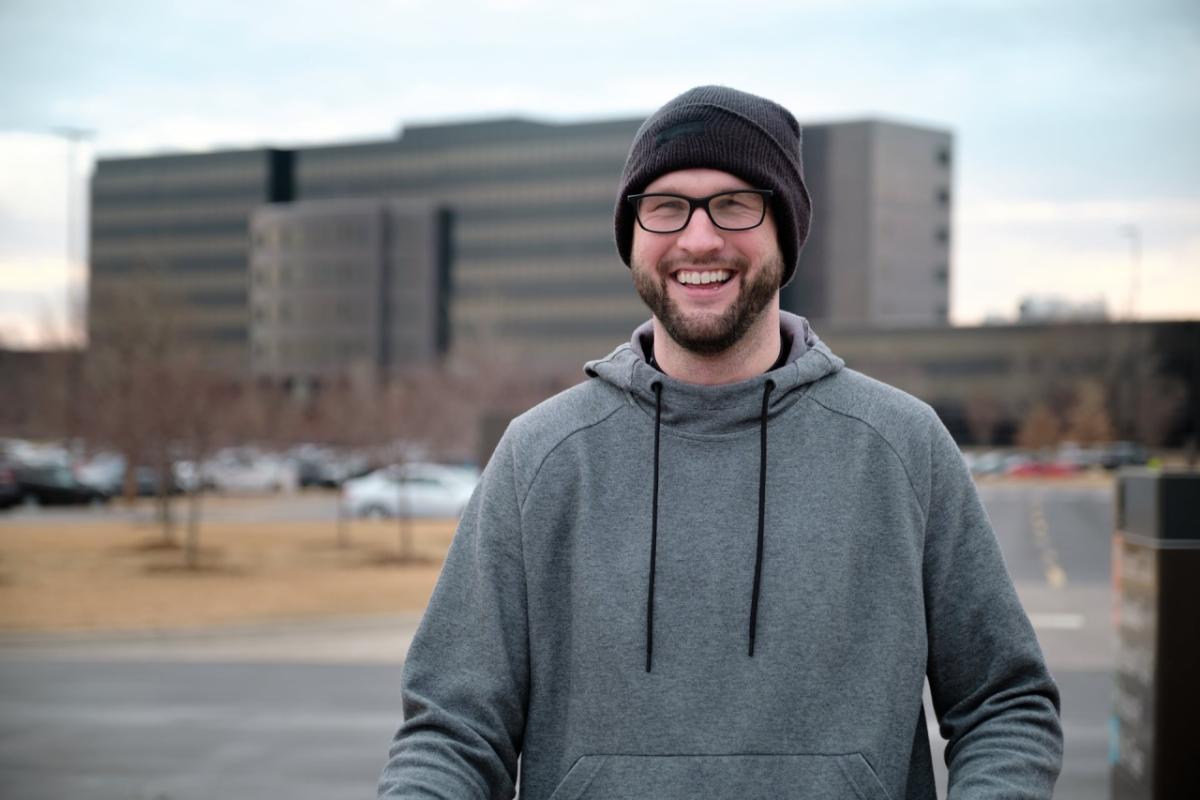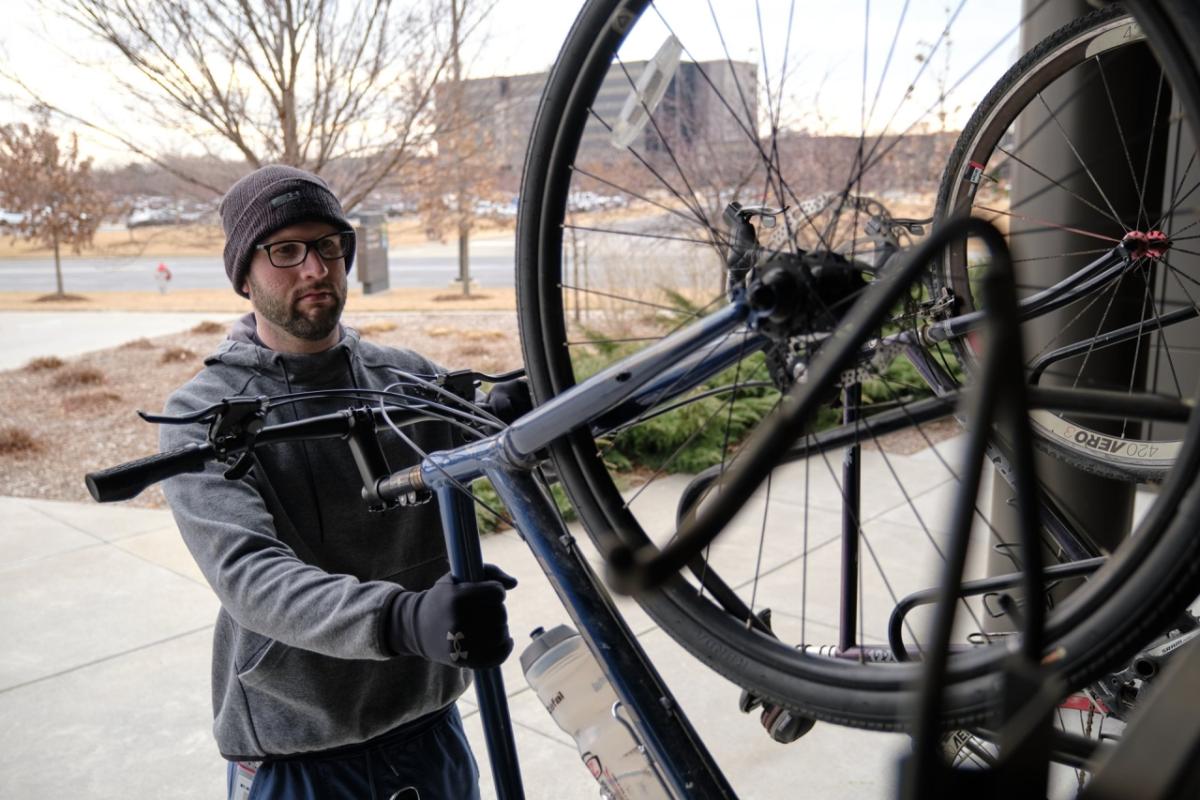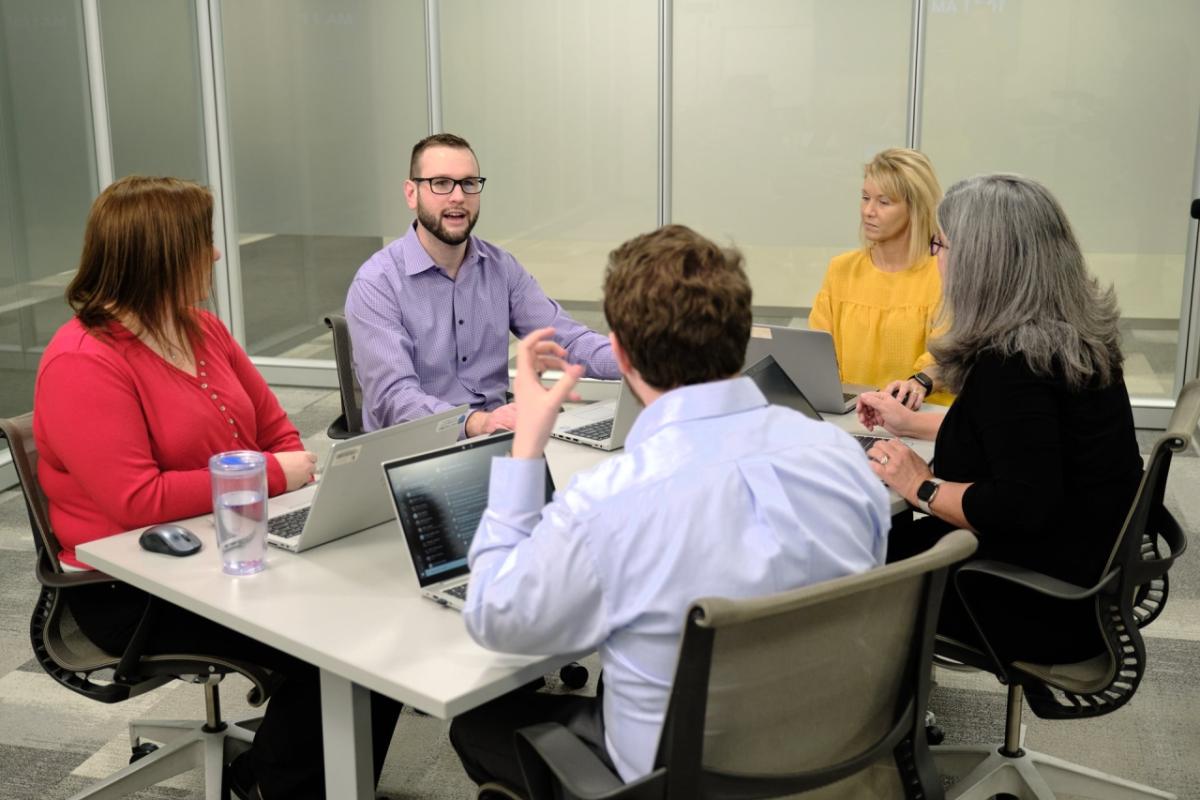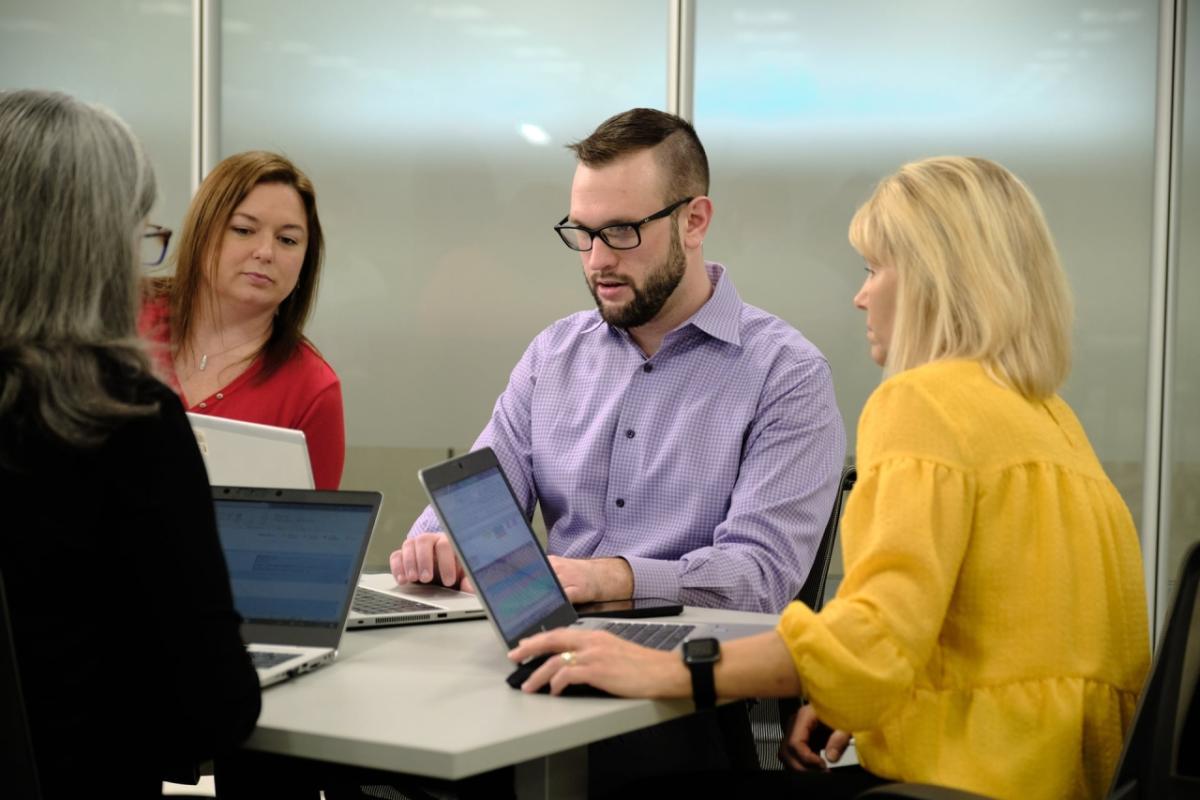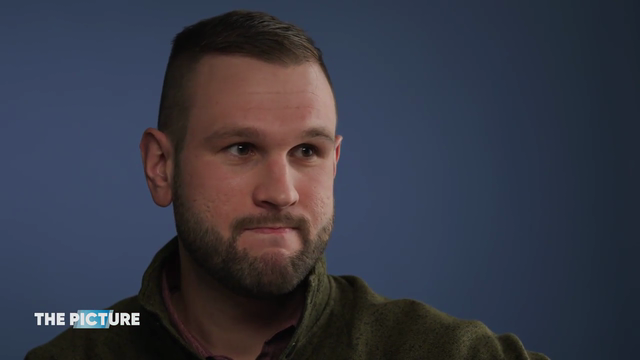How Koch Is Giving One Man a Second Chance at His Future
Cars on their morning commute zoomed by as a group of people from the Winfield Correctional Facility picked up trash along the highway.
It wasn’t glamorous work for Richard McMichael, but it at least got him outside. It was a welcome change after having already spent nearly four years in prison. Every day as the group moved its way along Kansas State Highway 96, Richard would often look up at one of the only buildings he could see from the road – Koch Industries' headquarters – and watch with fascination as people arrived for the day and entered the building.
“I was so jealous,” Richard said. “I just always wondered what they're going to do in there and what it looked like in there.”
A year later, he doesn’t have to imagine anymore. He’s now an accountant for Koch Minerals and Trading. Koch gave Richard a "second chance." Second chance hiring is the practice of hiring individuals with a criminal record. His journey illustrates how removing barriers for people coming back into the workforce after serving a prison sentence can mutually benefit those individuals, the companies that hire them and the communities where they live.
Working at Koch wasn’t part of the plan when Richard first arrived in Lawrence to study petroleum engineering at the University of Kansas. For that matter, neither was going to prison. He was a bright kid from Texas. School always came a little easy, especially science and math. Because of this, Richard said he didn’t really take school all that seriously and started making poor decisions.
First, he was arrested for aggravated battery after a bar fight. Then, in order to pay his bills – including those for his legal fees – he turned to selling drugs.
“Once you start down that path,” he said, “it's hard to stop making bad decisions because it escalates. The pressure keeps coming and you keep making more bad decisions to make the situation worse, which drives you to make even worse decisions. It's a never-ending cycle.”
Richard said he was not a very good criminal and was eventually caught and charged. He pled guilty. A judge sentenced him to 61 months in prison.
“All of a sudden you’re in a cell,” he said, “and then it’s like, ‘OK, now what?’”
Demoralized and feeling useless in the monotony of prison life, he began to spend his time doing one of the few things allowed – reading. Richard read lots of articles, but one stood out above the rest. It was by Mark Holden, who at the time was Koch Industries’ general counsel. It laid out the case for criminal justice reform, including Koch’s support for second chance hiring.
Richard knew only a little about Koch at the time, but the article sparked an insatiable interest.
He read anything and everything he could about the business and its philosophy, Market-Based Management®. His mom would send him every article she could find that mentioned Koch. Eventually, he got a hold of Charles Koch’s book, “Good Profit.”
From that point on, his goal was to get a job at Koch. That goal would become his North Star and push him forward as he served the rest of his sentence and endured the hardships of life incarcerated. No longer would he allow his past mistakes to define who he would be in the future.
“I got a lot of pushback,” he said. “I don't know how I convinced myself that it was a realistic goal, but I did. I was confident if I tried to apply the principles I was learning from the book, such as Principled Entrepreneurship™ and a continued dedication to learning and improving myself, that I was going to get there.”
As he began to apply the principles he was learning in “Good Profit,” he decided he needed to finish his degree before he could begin to make his dream a reality. It wasn’t easy, but Richard obtained permission to start taking classes from Adams State University in Colorado. The school would mail him the work, he’d complete it and send it back.
“When I got my second chance at school,” he said, “I really took it seriously.”
After about two years, he completed a bachelor's degree in business administration and graduated.
With his degree in hand, Richard thought he was finally ready to reach out to Koch, even though he still had about a year left on his sentence.
He wrote several letters. One made its way to John Buckley, who leads Koch’s second chance hiring efforts.
“We want to create opportunities for justice-involved people to be contributing members in our society again,” John said. “We're creating that opportunity through employment.”
One in three Americans has a criminal record. Helping those individuals contribute valuably to society again by removing unnecessary barriers to employment is beneficial for the individual, the business and society, John says.
It’s why John is working to help Koch companies across the country build relationships with corrections departments and community groups, such as Honest Jobs. In 2021, Koch also partnered with other major employers to form the Second Chance Business coalition. It aims to help provide major employers with a set of tools, relationships and expertise to help them successfully hire and support people with criminal records. Businesses such as JPMorgan Chase, General Motors, The Home Depot and Target are all part of the organization.
In addition, Koch "banned the box" in 2015, meaning it doesn’t ask applicants about their criminal history, and has worked to encourage other companies to do the same.
John says breaking down the stigma associated with those who have a criminal record is also a big part of his work.
“We've all made mistakes, and you don't want somebody to suffer for their entire life because of a mistake they made,” he said. “They paid their dues, and that’s why we call it second chance. If they can demonstrate the virtues, then there's no difference in my mind between them and somebody who has not had any criminal past.”
Kansas Secretary of Corrections Jeff Zmuda says people often don’t realize that almost everyone who gets sent to prison will be released. Building partnerships between businesses and the Department of Corrections to help remove employment barriers and create second chances is an important step toward giving those people the best chance for success.
“Business benefits by having a good worker,” Jeff said. “Communities benefit by having someone that’s less or no threat to the community. Families are reunited. They’re no longer a drain on the tax system. It’s a win-win-win.”
After John received Richard’s letter, he contacted him. John told Richard he couldn’t promise him a job, but he’d help where he could. That included several intense resume critiques and interview coaching sessions.
“I was very critical, and he was open to that,” John said. “I think that gave a good sign of his ability to adapt to the culture. He's willing to take criticism and he openly seeks criticism.”
By this point, Richard had been transferred to the Wichita Work Release Facility and was ready to find a job. The work release facility helps people transition back into the community before the end of their sentence.
John told Richard to go on to KochCareers.com and find five or six positions Richard thought he could fill and send the job descriptions to him so he could help Richard develop his resume.
“I think working with John set me up for success and gave me confidence,” Richard said. “I felt timid coming in to interview with a criminal record and still being in prison. But John reaching out to me made it seem like, ‘Oh, this can happen. There's a chance here.’”
After his first interview, Richard was discouraged. He didn’t think it went very well, but those on the other side of the call disagreed. Koch offered him the position.
Lynne Baker is Richard’s supervisor now and was a part of the interview team. Because Koch banned the box and removed the requirement for applicants to disclose prior criminal records during the application process, Lynne didn’t know about Richard’s situation before the interview. And even after he told her that he was still in prison during the interview, she didn’t make much of it.
“He had the skills and knowledge that we were looking for,” Lynne said. “He had the right values and beliefs, and it was just very exciting to talk to someone that was so excited to work for Koch.”
Her biggest concerns were the logistics of his situation. Logistics that are not a concern for most other Koch new hires. She had questions such as, how would he get to and from work? And did he have regular clothes to wear to the office? Seemingly simple things for most people were much more difficult for Richard.
But he was used to overcoming obstacles and was ready to do whatever it would take to achieve his goal.
That means most days Richard gets up around 3:45 in the morning so he has enough time to ride his bike the nearly eight miles from the Wichita Work Release Facility, through downtown Wichita and up to the Koch office building on the edge of the city. His early start time means he is usually ready to go at his desk by 6 a.m. – two hours before normal office hours begin.
He's usually one of the first people into the office and the last one to leave.
“Where I sit, you can walk over the window and see the highway where I used to pick up trash and it's a very good reminder to always be humble,” Richard said. “Anytime something happens at work and I want to get annoyed or agitated, all I’ve got to do is look at the highway. Then I just go right back to smiling and back to work.”
He said the opportunity he’s getting at Koch is allowing him another restart at life – a chance to have a future. He no longer feels as if he's a drain on society. He takes great pride in his work. And above all, he said his mom is finally happy again.
Richard has only been working full-time at Koch for about six months, but it’s already better than he thought it would be. He hopes to stay working at Koch as long as possible.
Most of his co-workers didn’t know that he was in prison until just recently. Richard said he wanted to prove he could do the job before telling them. He says the few who did know since he started have been extremely helpful, especially Kiera, who sits next to him.
“They sat me next to the person on our team that knows everything,” he said. “She’s very open minded and not judgmental. It was a huge blessing sitting next to her.”
While focusing on second chance hiring at Koch is relatively new, John says they’ve already seen success and increased interest in the program. He hopes to see more stories like Richard’s as managers and HR representatives – inside and out of Koch – begin to see the mutual benefits it can bring and the lives it can change.
“He's a model employee,” John said. “And I think he's a great example for not just folks who are reentering society, but all of our employees.”





